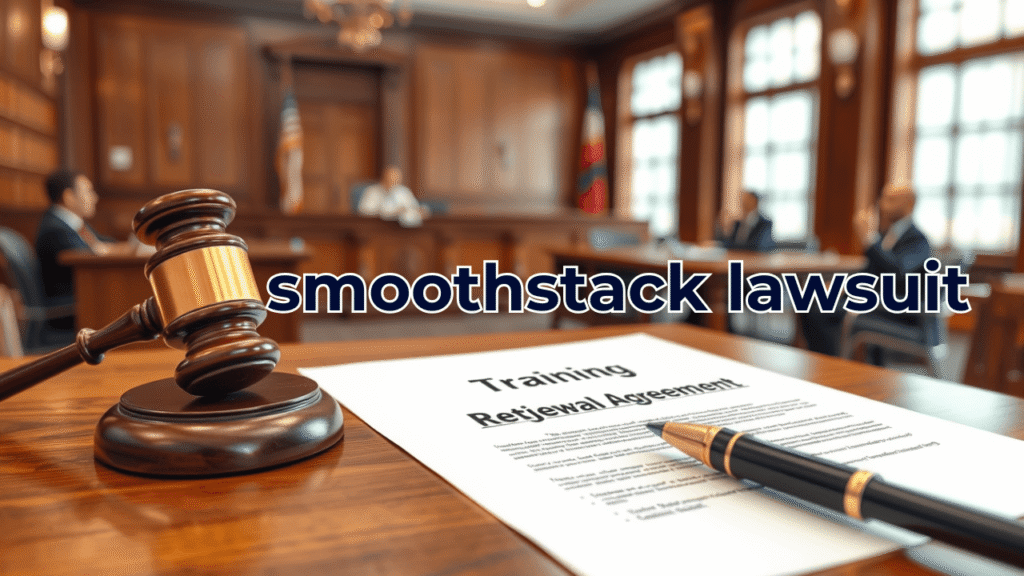The lawsuits piling up against Smoothstack are not just about one tech staffing company—they’re sparking a national conversation about fairness in the workplace, particularly in the high-pressure world of IT. At the center of this storm? Training Repayment Agreement Provisions—better known as TRAPs. Critics say these contracts don’t just train workers; they trap them. Let’s dig into what’s really going on.
What Is the Smoothstack Lawsuit All About?
The short version: Smoothstack stands accused of exploiting new hires through coercive contracts, unfair wages, and restrictive agreements. The company presents itself as a launchpad for IT careers—offering intensive training, access to big-name clients like Bloomberg, Capital One, and Johnson & Johnson, and a pathway to lucrative jobs.
But according to former trainees and now federal lawsuits, the reality looks very different. Smoothstack allegedly lures candidates in with promises of training and job placement, only to lock them into contracts that make leaving nearly impossible without paying a hefty financial penalty.
Latest Updates on the Smoothstack Lawsuit
As of early 2025, the Smoothstack lawsuit continues to gather national attention, with both federal agencies and worker advocacy groups closely monitoring the case. The Department of Labor’s (DOL) action has not only intensified scrutiny around TRAP contracts but has also encouraged more former trainees to come forward. While the court has not yet issued a final ruling, several procedural updates have reignited public interest:
Also Read
- More workers have submitted statements alleging financial pressure, retaliation concerns, and misinformation during their hiring process.
- Lawmakers in several states, including California, New Jersey, and Illinois, have proposed new bills targeting Training Repayment Agreement Provisions (TRAPs). These proposals aim to limit the duration of repayment obligations and cap excessive penalty fees.
- Legal analysts predict that if Smoothstack loses, the decision could set a benchmark for how tech staffing agencies nationwide design their training and employment agreements.
Although no trial date has been finalized, the growing political and legal momentum around TRAPs suggests that 2025 could be a decisive year for the case.
How Do TRAP Agreements Work?
On paper, TRAPs sound like a trade-off: the company covers your training costs, and you agree to work for them long enough to repay that investment. In practice, critics say they’re a modern-day version of indentured servitude.
Smoothstack’s TRAPs reportedly require trainees to complete 4,000 hours of billable work before they can leave. To put that in perspective, that’s about two full years of work at a standard 40-hour week. If someone leaves early? They face penalties that can exceed $20,000.
To make matters worse, Smoothstack controls how assignments are handed out. Workers can’t just hustle harder to hit their hours faster, because the company decides when and where they’re placed. Between gigs, they’re reportedly stuck earning minimum wage—and still barred from seeking better opportunities elsewhere.
Why TRAPs Are Facing National Pushback
While Training Repayment Agreement Provisions were once limited to niche industries, the controversy around Smoothstack has brought widespread attention to how these contracts restrict mobility. In 2025, worker-rights organizations argue that TRAPs have evolved into a corporate tool for controlling employees rather than a genuine educational investment.
Reports from advocacy groups highlight three key concerns:
- Lack of Transparency: Critics say many trainees are not told the true costs of training or the long-term financial risks.
- Unequal Bargaining Power: New graduates desperate for tech jobs often feel they have no choice but to accept these agreements.
- Industry-Wide Patterns: Similar lawsuits have emerged against other staffing firms, suggesting systemic issues with how tech training programs operate.
This growing backlash has pushed federal regulators and state officials to evaluate whether TRAPs should be restricted or banned altogether—especially in industries where job mobility is essential.
The First Lawsuit: Virginia, 2023

The initial lawsuit against Smoothstack landed in April 2023 in Virginia’s Eastern District Court. A former trainee claimed the company violated federal labor laws by:
- Forcing employees into restrictive contracts with non-compete clauses.
- Paying “trainee” wages below market rates while assigning them regular employee work.
- Failing to provide fair working conditions, including minimum wage and overtime.
- Enforcing illegal kickbacks through its TRAP system.
- Interfering with employees’ ability to find work outside the company.
Although the lead plaintiff eventually settled some of his personal claims, the broader class action effort stumbled. Without an active representative, the case couldn’t move forward—but the issue was far from dead.
Round Two: Department of Labor Steps In (2024)
In July 2024, the Department of Labor (DOL) filed its own lawsuit against Smoothstack in New York. This move significantly raised the stakes. Instead of one individual fighting back, the federal government is now challenging the company.
The DOL argues that Smoothstack’s contracts don’t just harm workers; they actively block the agency from doing its job. If employees fear retaliation or lawsuits for speaking out, they’re less likely to cooperate with federal investigators. That makes enforcement of labor laws nearly impossible.
This new lawsuit mirrors the earlier claims—restrictive contracts, low pay, coerced agreements—but adds violations of New York state worker protection laws to the mix. If certified as a class action, this case could affect a large pool of current and former Smoothstack workers.
If you’re looking to stay updated on how major legal cases shape labor rights, media narratives, and national policy, be sure to explore our in-depth coverage at DailyNewsLaw: The New Face of Legal Journalism Online. It offers clear breakdowns of complex legal issues and tracks how lawsuits like Smoothstack influence workplace protections across the United States.
Legal Timeline of the Smoothstack Case
A structured timeline helps bring clarity to a case with many moving parts. Here’s a breakdown of major events:
April 2023
The first lawsuit is filed in Virginia, accusing Smoothstack of wage violations, forced repayment agreements, and illegal kickbacks.
Late 2023
The class action effort stalls after the original plaintiff resolves some personal claims, leaving the lawsuit without a lead representative.
July 2024
The Department of Labor launches its federal lawsuit against Smoothstack, alleging violations of labor standards and unlawful contractual restrictions.
Late 2024
Additional workers come forward, and advocacy groups begin providing support for potential class certification.
January–March 2025
New statements from former employees emerge. State legislators start introducing TRAP-related reforms, citing the Smoothstack controversy as a key influence.
Ongoing (2025)
The court has not yet issued a final ruling, but the case remains active and continues to expand in scope.
Why This Case Matters for U.S. Workers
Smoothstack’s legal troubles are bigger than one company. They highlight ongoing debates about workers’ rights across industries:
1. Non-Compete Agreements
Once limited to executives guarding trade secrets, non-competes are now slapped on entry-level workers. Even unenforceable ones scare employees away from better jobs. Lawmakers are pushing for tighter regulations—or outright bans—on these clauses.
2. Wage and Hour Violations
Misclassifying employees as “trainees” or contractors remains a loophole companies exploit. The Fair Labor Standards Act (FLSA) sets minimum wage and overtime standards, but enforcement is uneven. Smoothstack’s case underscores why proper classification matters.
3. Working Conditions in Tech
From long hours to repetitive strain injuries, IT workers face unique challenges. Federal agencies like OSHA are tasked with keeping workplaces safe, but retaliation against whistleblowers is still a concern.
4. Training Programs as Leverage
Training should be an investment in employees, not a financial leash. Critics of TRAPs say they give companies the upper hand while leaving workers powerless.
5. Collective Bargaining and Unions
Union membership in tech is rare, but cases like this might reignite conversations about organizing. Workers with collective bargaining power can push back against exploitative contracts far more effectively than individuals can.
If you’re interested in exploring more about how digital platforms shape conversations and spread information, check out our detailed blog on BackStageViral .com – Your Go-To Hub for Trending Stories and Viral News. It dives into how viral stories gain momentum and why platforms like these matter in today’s fast-moving media world.
The Bigger Cultural Shift
It’s worth noting how the broader workplace culture has evolved. “Hustle culture” once glorified long hours and personal sacrifice as the ticket to success. But the rise of “quiet quitting” showed a pushback—workers refusing to overextend for companies that don’t value them.
The Smoothstack lawsuits may be part of this larger movement, where workers and regulators alike are questioning outdated practices and demanding fair treatment.
Frequently Asked Questions
1. How do I join the Smoothstack lawsuit?
If you think you’re affected, contact an attorney specializing in class action suits. If the case gets certified, the plaintiff’s legal team will reach out to potential members.
2. How much money could workers receive?
That depends. If the lawsuit ends in a settlement or victory at trial, payouts will vary based on each individual’s experience. The class attorneys will handle distribution.
3. What exactly is a TRAP?
A Training Repayment Agreement Provision is a contract that forces employees to pay back training costs if they leave too early. In Smoothstack’s case, critics argue the penalties are excessive and the terms unreasonable.
Final Thoughts
The Smoothstack lawsuits are still unfolding, but they’ve already ignited a vital conversation about fairness in tech and beyond. Whether the courts side with workers or the company, one thing is clear: the days of unchecked exploitative contracts may be numbered.
When workers are trapped instead of trained, it’s not just a legal issue—it’s a cultural one. And this case might just be the tipping point.





